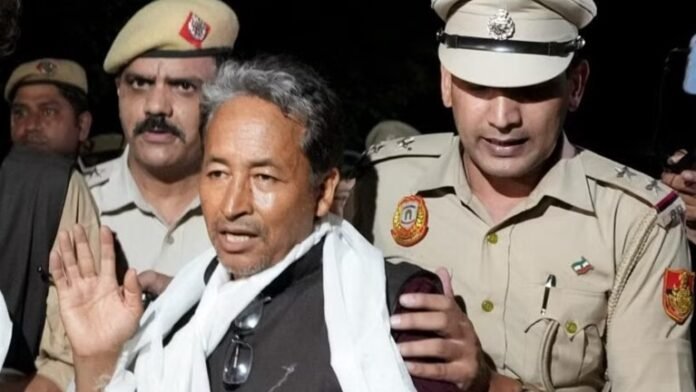New Delhi: Sonam Wangchuk, the renowned climate activist and engineer known for his innovative approaches to sustainable development in the Himalayas, has been released from detention after a brief period of confinement. Wangchuk was detained for his vocal protests against government policies that he deemed detrimental to the environment and the indigenous communities in Ladakh. His release has sparked discussions not only about the state of activism in India but also about the implications of political dissent.
The Circumstances of Detention
Wangchuk was taken into custody during a peaceful protest aimed at raising awareness about climate change and its impact on the fragile ecosystem of the Himalayas. His activism is particularly focused on advocating for sustainable practices, promoting water conservation, and emphasizing the importance of preserving traditional ecological knowledge among local communities. His detention was met with widespread condemnation from environmentalists, social activists, and concerned citizens who argued that silencing dissent undermines democracy and the right to free expression.
During his detention, there was significant outcry from various quarters, including fellow activists and members of civil society. Many viewed his arrest as an attack on environmental activism and a sign of the government’s increasing intolerance towards dissenting voices. Following his release, Wangchuk expressed gratitude for the support he received and reiterated his commitment to fighting for climate justice and sustainable development in the region.
Tushar Mehta’s Remarks
In the aftermath of Wangchuk’s release, Solicitor General Tushar Mehta made headlines by commenting on the role of Prashant Bhushan, a prominent lawyer and activist known for his criticism of government policies. Mehta suggested that Bhushan’s efforts appeared to be aimed at “keeping the pot boiling,” implying that Bhushan’s actions were more about maintaining a constant state of agitation rather than pursuing constructive dialogue.
Mehta’s remarks reflect the ongoing tensions between government authorities and civil society activists. The use of the phrase “keeping the pot boiling” highlights the perception among some government officials that activists like Bhushan are deliberately stoking dissent rather than seeking resolution or collaboration. This perspective raises critical questions about the nature of activism in a democratic society and the fine line between advocacy and agitation.
Implications for Activism in India
Wangchuk’s release and Mehta’s comments highlight the precarious position of environmental and social activists in India. The growing concern over climate change, coupled with the urgency of sustainable development, has brought activists to the forefront of national discourse. However, as seen in Wangchuk’s case, their efforts are often met with resistance from authorities who may view such activism as a threat to stability.
The detention of prominent activists raises broader issues regarding civil liberties and the rights of individuals to express dissenting opinions. In a country where environmental degradation and climate change pose significant threats to livelihoods and ecosystems, the role of activists in advocating for policy changes becomes increasingly crucial. Nevertheless, the government’s stance on dissent and criticism can create an atmosphere of fear and caution among those willing to speak out.
The Path Ahead
In light of Wangchuk’s release, environmentalists and activists are urging the government to engage in meaningful dialogue about climate policies and their impact on vulnerable communities. The need for sustainable development practices, especially in ecologically sensitive regions like Ladakh, cannot be overstated. Wangchuk’s expertise and local knowledge are invaluable in addressing these challenges, and his release signals an opportunity for constructive engagement.
While Tushar Mehta’s comments may reflect a governmental perspective on activism, they also highlight the importance of dialogue in addressing concerns raised by activists. Building bridges between the government and civil society can facilitate better understanding and lead to collaborative efforts in tackling pressing environmental issues.
Sonam Wangchuk’s release from detention marks a significant moment for climate activism in India. It underscores the ongoing struggle for environmental justice and the rights of activists to voice their concerns without fear of reprisal. Tushar Mehta’s remarks regarding Prashant Bhushan serve as a reminder of the complex dynamics between government authorities and civil society, emphasizing the need for constructive dialogue rather than antagonism.
As the urgency of climate action continues to grow, the role of activists like Wangchuk will be pivotal in shaping policies that prioritize sustainability and the well-being of future generations. The challenge remains to foster an environment where dissent is not only tolerated but welcomed as a vital part of democratic discourse, essential for addressing the pressing issues of our time.

